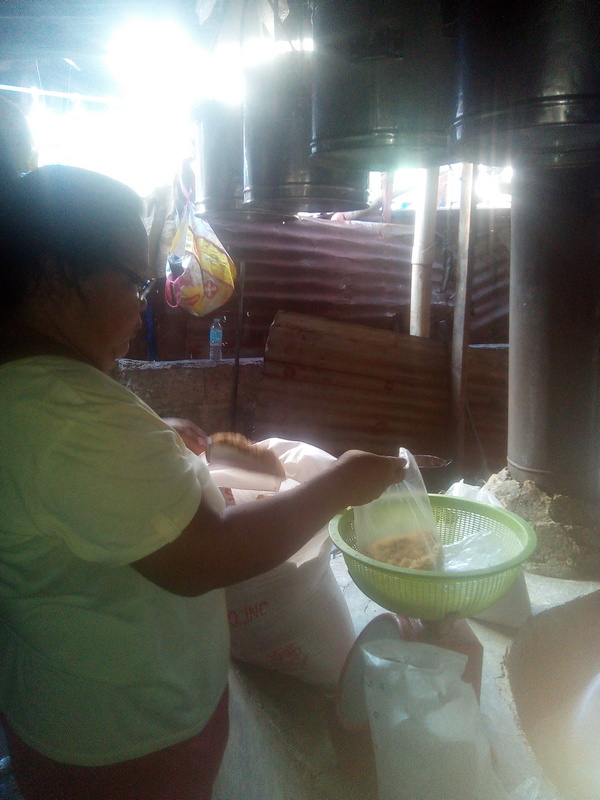
Bienvinida “Nida” Abrigana is hands on in running her taho business. She even measures the sugar to be caramelized, which is one of the steps in making taho. CDN PHOTO/LALAINE JURADO
It’s hard not to get nostalgic when you hear somebody shout “Taho! Taho!” on early mornings. For most people in Cebu, they have grown up enjoying this local treat.
For the past 18 years, Bienvinida “Nida” Abrigana’s life revolved around taho, a popular Filipino snack made of fresh silken tofu mixed with caramelized sugar and sago pearls.
Nida, 52, started as a taho vendor in 2000 under the business of her brother-in-law where she also partly managed. Gaining experience in the trade, she decided to put up her own taho factory at Barangay Bulacao, Cebu City in 2001.
Originally from Malaybalay City in Bukidnon, Nida and her sisters decided to move to Cebu to find opportunities.
Just like any other people moving to a new place, they had to go through a lot of struggles in their first few years staying in Cebu.
“We worked before establishing this business because it was really difficult at that time especially we were not from Cebu,” Nida told Cebu Daily News in Cebuano.
Prior to venturing into the taho business, Nida worked as a housemaid.
How it started
It was when she started working as a taho vendor that she met her husband Geronimo Abrigana who was also a vendor like her.
The husband and wife tandem started their own factory with a capital of only P100,000 which they used to buy machines and ingredients.
They were able to save enough money to build a second factory which proved to be a good move since their business developed and more vendors ordered taho from them.
But their factories were demolished in 2016 when the lot where they were built was reclaimed by a private owner. Now, they are sharing an area with her brother-in-law.
“It is a challenge because our factories were demolished and now we are just sharing an area with my brother-in-law, who also sells and supplies taho. We share the same place, but we use different machines for our taho ventures,” she said in Cebuano.
She also described the taho business as a challenging business, because it would involve a lot of effort and patience especially when selling it to customers.
The lost factories had forced her to scale down her business as she had only two to four workers when she had five to ten of them when her factories were operational.
Despite this, Nida said that the business had helped her family and a lot of her relatives, and on the workers’ side, their families and relatives also benefited from their working at Nida’s taho factories.
Benefits of taho
Taho is made of fresh tofu and is high in protein which is processed, in this case by Nida’s workers, to make it soft before dawn. Some workers would prepare the sweetener and the tapioca pearls, which would be be put on top of the taho.
Today, four workers would process the ingredients to make taho and sell this to 50 vendors, who will also sell the product at different locations.
Usually, the vendors would sell taho in places like Naga City, Carbon Market, San Fernando town and some would even go further to Carcar City.
She said it would really depend on the vendors on where they would sell the taho as long as they would just remit the money to her.
“Kasagaran gud manuroy namo ug taho kay dili madawat sa construction, di madawat ug mga mall kay walay mga grado, mao nay mga taho vendors, (Usually, our vendors are those people who are not accepted for jobs like on construction sites and at malls because they don’t have a degree or formal education, those are our taho vendors),” Nida said.
She said her only requirements for a person to work for her was for them to know how to sell taho and to know how to honestly remit their day’s sales to her.
Jerry Ilyadora, a 47-year-old taho vendor from Talisay City, said that many people still buy taho depending on the area where you’re selling it. He usually sells at Bulacao, Pardo where the buyers are people living in subdivisions. At the end of the day, he would usually have P400 to P500 from selling the product.
He said that being a taho vendor had helped him to provide for his family and send his daughter through college.
With 18 years of selling taho, Lolot (not his real name) had gained a lot of avid buyers since he sells at the Cebu I.T. Park and his usual buyers are the call center agents.
He said his average earnings per day is P1,000.
“Lami man gud ng taho gud. Paborito sad na nila. Ang taho sad, high protein man gud siya unya barato ra sad (Taho is delicious and many people like it. It is also high in protein),” Lolot said.
Motivation
Nida said what motivates her to continue with the business are her family and relatives.
With the business, she also, like her workers, had sent her two sisters and her relatives through college.
One of her sisters, now works as a support staff at The Glenelg School of Abu Dhabi while her other sister works at a factory in the Mactan Export Processing Zone.
Despite this, Nida said she would continue to run her business so that she could also help her other relatives who needed help with their schooling. / Cebu Normal University Intern Lalaine Jurado

